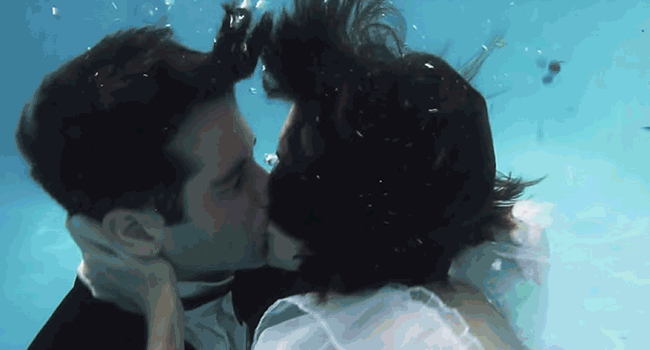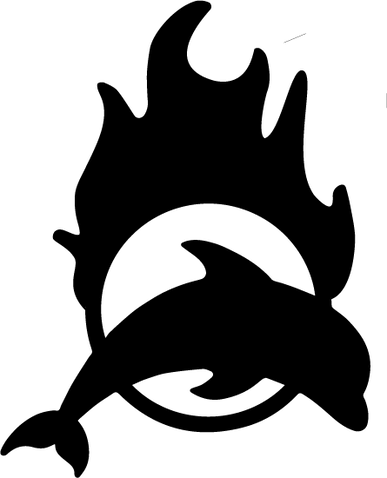
Si Nos Dejan
2013
Celia Rowlson-Hall
A love story told through bubble baths, Hollywood movies, interrupted fantasies, Mariachi songs, beachcombers, missed connections and Pamela Anderson.
Celia Rowlson-Hall created this film for Borscht 8
PRESS
"From a groom carrying his drowned bride on the beach, to a painfully awkward pole dance in a cheap motel, Rowlson-Hall’s scenes pulse with complex emotions, invoking anger and pathos at the same time. Rowlson-Hall has a lithe, delicate beauty on camera, but when she puts on a wig and high heel shoes it somehow strips these symbols of their glamour and throws it back in the viewer’s (voyeur’s?) face. The image of her perched like a terrified bird atop the stripper pole, only to screech down it in short bursts, is a potent visual distillation that accomplishes in a moment what takes feminist theory libraries of text to communicate." Hammer to Nail
"[Celia Rowlson-Hall’s] films … lure the viewer into strange, hyper-saturated worlds unto themselves, where movement does the talking in both loud and subtle ways. They can be disturbing or disarming, garish or achingly poignant." Dance Magazine
"Celia Rowlson-Hall is one of the most refreshing voices in filmed choreography." Huck Magazine
GIFS
essay
The first time that I set eyes on Celia Rowlson-Hall was while watching her 2012 short Audition. She makes an impression. Rowlson-Hall is a striking figure of a woman—maybe 5’10” (taller when her hair is up in the pompadour that she seems to favor), with wide pale blue-green eyes and a mouth that is a broad slot when she isn’t wearing a grin that’s alternately hilarious or deranged. She is fawn-like and lithe, with an impressive wingspan and long, slender legs shown off, in Audition, by a miniskirt. Rowlson-Hall’s films are almost wholly dialogue-free, and she has cultivated the full-body expressivity of a silent film gamine. Her particular physical presence is the principle tool of her art, and she knows exactly how to use it for impact.
In Audition, an actress, played by Rowlson-Hall, is trying out for the part of ‘Clipboard Woman.’ It’s a seemingly undemanding walk-on part but, in a single unbroken shot, an unseen interlocutor puts her through a series of ridiculous trials for it. The voice’s demands quickly move from silly to violating and demeaning, with Rowlson-Hall gamely dragging herself through the ordeal, hacking off her hair, spider walking, pummeling then gagging herself, even playing a sexy frog. When the interviewer in Audition demands “Can you re-enact a scene from your favorite movie?”, Rowlson-Hall uncaps a bottle of water and dumps it on her cast-back head, striking the arched pose of chair-dancing Jennifer Beals in Flashdance.
This may or may not be ironical. Virginia-born Rowlson-Hall is, first things first, a dancer. She graduated in 2006 with a BFA in Modern Dance from the University of North Carolina School for the Arts in Winston-Salem, and arrived in New York City not long afterwards. She showed every sign of making a success on stage, dancing with Monica Bill Barnes and Faye Driscoll and, in 2010, winning a Bessie Award for work in Driscoll’s 837 Venice Blvd. Rowlson-Hall had been doing music video choreography (MGMT, Chromeo) as well, and this is what put her onto making her own short films. In some of her early videos there is a tendency towards twee, but this is gradually planed away by an assertive stuntwoman fearlessness, an element of danger. In full-steam motion Rowlson-Hall displays an antic energy that threatens injury, a kamikaze physicality captured in the exhausting go-for-broke single takes of Audition, 2010’s Prom Night, or Goody! Two Shoes, the last done on commission for Brooklyn fashion house Keller. (Rowlson-Hall has done a number of such “fashion films,” and costuming plays a vital role in her films, each of which takes place in its own self-contained world.) Si Nos Dejan, a 10-minute short commissioned by Miami’s BorschtCorp, is arguably Rowlson-Hall’s most ambitious piece to date, a string of scenes revolving around a man and woman dressed as though for a wedding, embarking on the strangest nuptial ceremonies that you will ever see. The film opens on the slo-mo image of a tuxedoed groom (Andrew Pastides) emerging from the Atlantic with a waterlogged, possibly-dead bride (Rowlson-Hall) in his arms. Are they being born from the primordial soup? Castaways from a honeymoon cruise? Inverting the ending to the music video for “Last Dance with Mary Jane”? Pastides drops his cargo onto the sand, where Rowlson-Hall’s limp body is discovered by an elderly beachcomber with a metal detector, who stoops to dig around inside her mouth, presumably for gold fillings.
From here we go to a seedy-looking hotel suite, an exemplar of South Florida jungle room décor, replete with a ceiling mounted disco ball and a stripper pole. Wearing a heap of a blonde wig and a frothy, sea-foam green party dress, Rowlson-Hall mounts and latches onto the pole, by way of a stool, which she kicks aside as one might when hanging one’s self. Clinging to the pole for dear life, she slides to the bottom in incremental squeaking slips, before finally plopping onto the tiled floor. Next sitting down to watch a movie, she removes the wig and props it on her knee, putting her arm around it as though it was a companion. We can’t see what Rowlson-Hall’s watching, though we hear the 20th Century Fox fanfare and then a fusillade of gunshots which send her ducking for cover—she uses a wad of gum to simulate a wound, then tears a strip off of her dress to tourniquet it.
This is the play-acting of a restless child left to her own devices—shades of Juliet Berto’s performances for Jacques Rivette—sampling different roles as they pop into her head. Similarly, in Prom Night, Rowlson-Hall can be seen dressing up as The Virgin Mary, Lolita, Marilyn Monroe, and Madonna until, dumping a punch bowl over her head, she does Carrie as her encore. Rowlson-Hall seems fascinated by that space where a performer’s eagerness to please becomes a psychic break, compromises the ego—mutable identities and wild mood swings are essential to her work. Though she winningly beams like a “Make ‘em laugh” Broadway hoofer when dancing, in repose she will acquire the feral, haunted look of a woman from Egon Schiele’s sketchpad. In Way to Go- Neighbors, an episode of “Like Like,” Rowlson-Hall’s “playful collaboration” with fellow dancer/ choreographer Lexy Hulme, both women cycle through several dozen outfits in the space of three-and-a-half minutes. And Rowlson-Hall’s dancing has this same aspect of trying things on for size and quickly discarding them: A veritable Swiss Army knife of styles, she will go from a Ray Bolger crazy-legs to hip-hop to mime-in-the-invisible-box to vaudeville shuffle to Francoise Dorleac in Les Demoiselles de Rochefort, sometimes in the space of moments.
Rowlson-Hall isn’t the only role-player in Si Nos Dejan. When Pastides enters the jungle room after her, he’s wearing breakaway stripper-cop duds, executing a spin on the pole while he patrols the seemingly empty suite. (He and Rowlson-Hall always seem to be just missing one another.) Entering the bathroom, he strips down to tuxedo shirt, bow-tie and cummerbund, then submerges himself into a froth of bubbles in the hot tub. Rowlson-Hall enters the room, runs a hand through the tub, now seemingly empty, as though searching for something. She pisses into the foamy water while standing up, tucks her used wad of toilet paper into the toe of one of his shoes, then clunks off wearing the oversized Oxfords herself—a usurpation of the masculine role. This opens onto a cycle of rhymed water images, accompanied by Pastides singing a particular woebegone rendition of the title track, a song popularized by the Mexican singer Luis Miguel (The original kicks in over the closing credits.) A little boy on the beach in soaked tighty whities throws a penny into the surf. Rowlson-Hall and Pastides, hand-in-hand and looking ready to walk down the aisle, stand on the lip of a scummy, overgrown in-ground pool in the rain, seen in a dwarfing long shot. She watches him strumming the guitar from a distance, a shallow pool of water separating them. (In the over-the-shoulder reverse shot from his POV she is, curiously, absent.) Wearing the wig and something like the orange one-piece made famous by Pamela Anderson in Baywatch, Rowlson-Hall cradles the same little boy—cut to her at poolside, cradling Pastides in the same position, he looking limply marionette-like. Accompanied by a glinting shower of loose change, the couple plunge underwater, where they will really commune for the only time in the film, hungrily mashing their mouths together. When they surface, they’re alone again—in every instance, their union is a fleeting exception, their separation the rule.
Given the matrimonial wear and the lyrics of Miguel’s tune (Roughly translated: “If we leave/ We’re going to want a lifetime…”), it’s safe to say that Rowlson-Hall is playing around with the idea of marriage, here seen as an almost-constant state of flip-flopping roles and missed-connection disunion. The final image of Rowlson-Hall and Pastides caught at the moment of diving into that slimy pool hand-in-hand could be taken as visualizing the adage “Taking the plunge,” but Si Nos Dejan generally operates on a less literal, more intuitive level. The same flowing, free-associative imagination at work in Rowlson-Hall’s dance—the means by which a pair of shoes will suddenly become defibrillator paddles in Goody! Two Shoes, for example—can be seen in the idiosyncratic logic by which these tableau are arranged, interfacing with one another and with her other films. Certain preoccupying symbols found elsewhere in Rowlson-Hall’s growing oeuvre have, for example, been repurposed here: The loose change is in her Three of a Feather, the water-as-wormhole in her Unto the Locusts. Around this point it’s standard to close by saying of an artist so young that it will be interesting to see what he or she does next. But in truth, what Celia Rowlson-Hall has done to-date is already seductive and uncanny in the extreme.
- Nick Pinkerton
PREMIERE
SXSW Film Festival, 2013
SCREENINGS
SXSW Film Festival, 2013
Brooklyn Film Festival, 2013
Glasgow Short Film Festival, 2014
New Orleans Film Festival, 2013
Maryland Film Festival, 2013
Key West Film Festival, 2013
Citizen Jane Film Festival, 2013
Sidewalk Film Festival, 2013
Borscht Corporation
Borscht Special Projects
Calle 27 #601 e/ C y D, Vedado
La Habana, 10400, Cuba

 Borscht Corporation
Borscht Corporation











